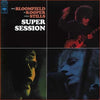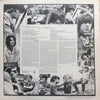



Mike Bloomfield, Al Kooper and Stephen Stills - Super Session
Mike Bloomfield, Stephen Stills (el-g) [click here to see more vinyl featuring Stephen Stills]
Al Kooper (p, org, voc, g, el-g); Barry Goldberg (el-p); Harvey Brooks (b); Eddie Hoh (dr)
Written by M. Bloomfield (A1, A4, A5), Al Kooper (A1, A4, A5), J. Ragavoy (A2), M. Shuman (A2), C. Mayfield (A3), Bob Dylan (B1), D. Leitch (B2), W. Cobb (B3), H. Brooke (B4)
1 LP, standard sleeve
Original analog Master tape : YES
Heavy Press : 180g
Record color : black
Record color : black
Speed : 33 RPM
Size : 12'’
Stereo
Studio
Record Press : Pallas
Label : Speakers Corner
Original Label : Columbia
Production: Al Kooper
Originally released in 1968
Reissued 2008
Tracks :
Side A :
- Albert’s Shuffle
- Stop
- Man’s Temptation
- His Holy Modal Majesty
- Really
Side B :
- It Takes A Lot To Laugh, It Takes A Train To Cry
- Season Of The Witch
- You Don’t Love Me
- Harvey’s Tune
Reviews :
« As the Beatles' Sgt. Pepper's Lonely Hearts Club Band (1967) had done a year earlier, Super Session (1968) initially ushered in several new phases in rock & roll's concurrent transformation. In the space of months, the soundscape of rock shifted radically from short, danceable pop songs to comparatively longer works with more attention to technical and musical subtleties. Enter the unlikely all-star triumvirate of Al Kooper (piano/organ/ondioline/vocals/guitars), Mike Bloomfield (guitar), and Stephen Stills (guitar) -- all of whom were concurrently "on hiatus" from their most recent engagements. Kooper had just split after masterminding the groundbreaking Child Is Father to the Man (1968) version of Blood, Sweat & Tears. Bloomfield was fresh from a stint with the likewise brass-driven Electric Flag, while Stills was late of Buffalo Springfield and still a few weeks away from a full-time commitment to David Crosby and Graham Nash. Although the trio never actually performed together, the long-player was notable for idiosyncratically featuring one side led by the team of Kooper/Bloomfield and the other by Kooper/Stills. The band is fleshed out with the powerful rhythm section of Harvey Brooks (bass) and Eddie Hoh (drums) as well as Barry Goldberg (electric piano) on "Albert's Shuffle" and "Stop." The Chicago blues contingency of Bloomfield, Brooks, and Goldberg provide a perfect outlet for the three Kooper/Bloomfield originals -- the first of which commences the project with the languid and groovy "Albert's Shuffle." The guitarist's thin tone cascades with empathetic fluidity over the propelling rhythms. Kooper's frisky organ solo alternately bops and scats along as he nudges the melody forward. The same can be said of the interpretation of "Stop," which had originally been a minor R&B hit for Howard Tate. Curtis Mayfield's "Man's Temptation" is given a soulful reading that might have worked equally well as a Blood, Sweat & Tears cover. At over nine minutes, "His Holy Modal Majesty" is a fun trippy waltz and includes one of the most extended jams on the Kooper/Bloomfield side. The track also features the hurdy-gurdy and Eastern-influenced sound of Kooper's electric ondioline, which has a slightly atonal and reedy timbre much like that of John Coltrane's tenor sax. Because of some health issues, Bloomfield was unable to complete the recording sessions and Kooper contacted Stills. Immediately his decidedly West Coast sound -- which alternated from a chiming Rickenbacker intonation to a faux pedal steel -- can be heard on the upbeat version of Bob Dylan's "It Takes a Lot to Laugh, It Takes a Train to Cry." One of the album's highlights is the scintillating cover of "Season of the Witch." There is an undeniable synergy between Kooper and Stills, whose energies seems to aurally drive the other into providing some inspired interaction. Updating the blues standard "You Don't Love Me" allows Stills to sport some heavily distorted licks, which come off sounding like Jimi Hendrix. This is one of those albums that seems to get better with age and that gets the full reissue treatment every time a new audio format comes out. This is a super session indeed. » AllMusic Review by Lindsay Planer
The musicians are aiming high with their desire for a “Super Session”, for it’s not something that can be planned. Only when the time, place, and audience play along, when one’s lucky star is shining brightly, and the musicians have a good day, then one of music’s great moments might be captured on tape. Not forgetting the recording technicians who also have to be in the mood!
In 1968 this all happened to be the case with the majority of the nine numbers on the Columbia LP: "Season Of The Witch" (written by Donovan) in its present version is one of them, as well as "You Don’t Love Me" and the Dylan classic "It Takes A Lot To Laugh, It Takes A Train To Cry". All in all, one must consider the numbers with Steve Stills as most successful in the sense of a session because here each musician inspires the others. In the super session with Kooper and Bloomfield, the guitarist stands in the limelight while the other musicians back him up.
Very often the three soloists even surpass the greatest moments of their own groups (Al Kooper’s Blood, Sweat & Tears; Mike Bloomfield’s Electric Flag; Steven Stills’s Buffalo Springfield). In 1968 the magazine Rolling Stone judged this album to be one of the best releases of the year: an accolade which is completely justified and is still valid to this day. What better reason to get your copy of this “highly recommended” album without delay.
Ratings :
Allmusic : 4.5 / 5 , Discogs : Rate Your Music :


